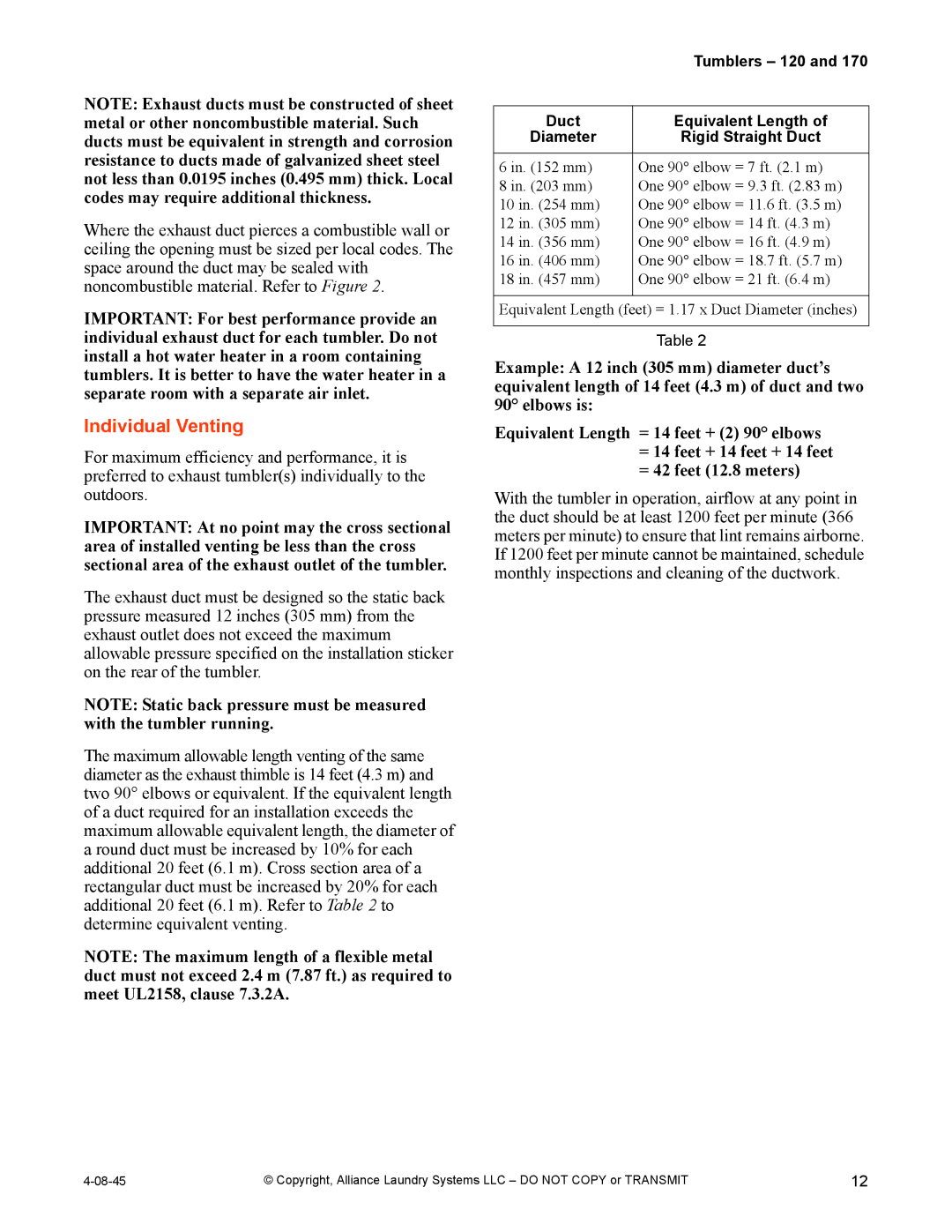
NOTE: Exhaust ducts must be constructed of sheet metal or other noncombustible material. Such ducts must be equivalent in strength and corrosion resistance to ducts made of galvanized sheet steel not less than 0.0195 inches (0.495 mm) thick. Local codes may require additional thickness.
Where the exhaust duct pierces a combustible wall or ceiling the opening must be sized per local codes. The space around the duct may be sealed with noncombustible material. Refer to Figure 2.
IMPORTANT: For best performance provide an individual exhaust duct for each tumbler. Do not install a hot water heater in a room containing tumblers. It is better to have the water heater in a separate room with a separate air inlet.
Individual Venting
For maximum efficiency and performance, it is preferred to exhaust tumbler(s) individually to the outdoors.
IMPORTANT: At no point may the cross sectional area of installed venting be less than the cross sectional area of the exhaust outlet of the tumbler.
The exhaust duct must be designed so the static back pressure measured 12 inches (305 mm) from the exhaust outlet does not exceed the maximum allowable pressure specified on the installation sticker on the rear of the tumbler.
NOTE: Static back pressure must be measured with the tumbler running.
The maximum allowable length venting of the same diameter as the exhaust thimble is 14 feet (4.3 m) and two 90° elbows or equivalent. If the equivalent length of a duct required for an installation exceeds the maximum allowable equivalent length, the diameter of a round duct must be increased by 10% for each additional 20 feet (6.1 m). Cross section area of a rectangular duct must be increased by 20% for each additional 20 feet (6.1 m). Refer to Table 2 to determine equivalent venting.
NOTE: The maximum length of a flexible metal duct must not exceed 2.4 m (7.87 ft.) as required to meet UL2158, clause 7.3.2A.
| Tumblers – 120 and 170 |
|
|
Duct | Equivalent Length of |
Diameter | Rigid Straight Duct |
|
|
6 in. (152 mm) | One 90° elbow = 7 ft. (2.1 m) |
8 in. (203 mm) | One 90° elbow = 9.3 ft. (2.83 m) |
10 in. (254 mm) | One 90° elbow = 11.6 ft. (3.5 m) |
12 in. (305 mm) | One 90° elbow = 14 ft. (4.3 m) |
14 in. (356 mm) | One 90° elbow = 16 ft. (4.9 m) |
16 in. (406 mm) | One 90° elbow = 18.7 ft. (5.7 m) |
18 in. (457 mm) | One 90° elbow = 21 ft. (6.4 m) |
|
|
Equivalent Length (feet) = 1.17 x Duct Diameter (inches)
Table 2
Example: A 12 inch (305 mm) diameter duct’s equivalent length of 14 feet (4.3 m) of duct and two 90° elbows is:
Equivalent Length = 14 feet + (2) 90° elbows
=14 feet + 14 feet + 14 feet
=42 feet (12.8 meters)
With the tumbler in operation, airflow at any point in the duct should be at least 1200 feet per minute (366 meters per minute) to ensure that lint remains airborne. If 1200 feet per minute cannot be maintained, schedule monthly inspections and cleaning of the ductwork.
© Copyright, Alliance Laundry Systems LLC – DO NOT COPY or TRANSMIT | 12 |
